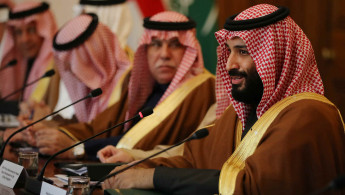HRW: Riyadh must investigate allegations of abuse, death at Ritz-Carlton jail
Seventeen of the 200 or so that were jailed were allegedly tortured, with one later dying while in custody.
2 min read
Mohammed bin Salman at 10 Downing Street [Getty]
Human Rights Watch on Wednesday called on Riyadh to immediately investigate claims that it mistreated and coerced people as part of its corruption probe launched in November.
According to a recent New York Times report, 17 of the 200 or so detainees at the makeshift Ritz-Carlton jail in Riyadh were reportedly hospitalised for physical abuse, one of which later died.
One person who saw the corpse said it was badly swollen and had signs of abuse, including a twisted neck and scars from what were likely electric shocks.
Riyadh has not provided an explanation for the death of Maj. Gen. Ali al-Qahtani, a top aide to Prince Turki bin Abdullah, an heir of the former King Abdullah.
"The alleged mistreatment at the Ritz Carlton is a serious blow to Mohammed bin Salman's claims to be a modernising reformist," said Sarah Leah Whitson, Middle East director at HRW.
Crown Prince and de facto leader Mohammed bin Salman launched the crackdown to consolidate his grip on power and retrieve billions in funds for Saudi coffers.
The majority of the detainees at the Ritz-Carlton struck monetary settlements to secure their freedom.
On 30 January, Saudi Arabia's attorney general confirmed that 381 had been subpoenaed during the corruption probe, with the kingdom seizing over $100 billion in assets. Fifty-six were reportedly still in custody then, to "continue the investigaions process".
"It is great that the Saudi government wants to combat corruption, but its alleged tactics look more like extortion, and make a mockery of the rule of law," Whitson added.
Holding detainees at makeshift detention centres violates international norms, according to article seven of the United Nations Human Rights Committee.
HRW has documented torture and abuse claims at Saudi prisons for years.
Follow us on Twitter: @The_NewArab
According to a recent New York Times report, 17 of the 200 or so detainees at the makeshift Ritz-Carlton jail in Riyadh were reportedly hospitalised for physical abuse, one of which later died.
One person who saw the corpse said it was badly swollen and had signs of abuse, including a twisted neck and scars from what were likely electric shocks.
Riyadh has not provided an explanation for the death of Maj. Gen. Ali al-Qahtani, a top aide to Prince Turki bin Abdullah, an heir of the former King Abdullah.
"The alleged mistreatment at the Ritz Carlton is a serious blow to Mohammed bin Salman's claims to be a modernising reformist," said Sarah Leah Whitson, Middle East director at HRW.
Crown Prince and de facto leader Mohammed bin Salman launched the crackdown to consolidate his grip on power and retrieve billions in funds for Saudi coffers.
The majority of the detainees at the Ritz-Carlton struck monetary settlements to secure their freedom.
On 30 January, Saudi Arabia's attorney general confirmed that 381 had been subpoenaed during the corruption probe, with the kingdom seizing over $100 billion in assets. Fifty-six were reportedly still in custody then, to "continue the investigaions process".
"It is great that the Saudi government wants to combat corruption, but its alleged tactics look more like extortion, and make a mockery of the rule of law," Whitson added.
Holding detainees at makeshift detention centres violates international norms, according to article seven of the United Nations Human Rights Committee.
HRW has documented torture and abuse claims at Saudi prisons for years.
Follow us on Twitter: @The_NewArab





 Follow the Middle East's top stories in English at The New Arab on Google News
Follow the Middle East's top stories in English at The New Arab on Google News
![The UAE is widely suspected of arming the RSF militia [Getty]](/sites/default/files/styles/image_330x185/public/2024-11/GettyImages-472529908.jpg?h=69f2b9d0&itok=Yauw3YTG)
![Netanyahu furiously denounced the ICC [Getty]](/sites/default/files/styles/image_330x185/public/2024-11/GettyImages-2169352575.jpg?h=199d8c1f&itok=-vRiruf5)
![Both Hamas and the Palestinian Authority welcomed the ICC arrest warrants [Getty]](/sites/default/files/styles/image_330x185/public/2024-11/GettyImages-2178351173.jpg?h=199d8c1f&itok=TV858iVg)